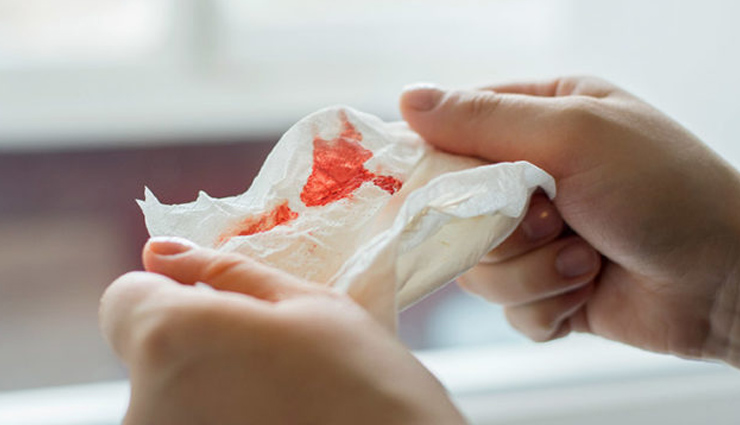- Home›
- Healthy Living›
- Quick Ways To Treat Nose Bleeding During Pregnancy
Quick Ways To Treat Nose Bleeding During Pregnancy
By: Priyanka Maheshwari Wed, 15 July 2020 7:07:55

Pregnancy is a roller coaster experience. While you get to enjoy the wonderful feeling of carrying and nourishing a life, you also have to deal with several upsetting problems.
Nosebleeds, also known as epistaxis, is one such distressing problem that women often experience in the last stage of pregnancy. However, some women even experience it during the first trimester.
A nosebleed means you are experiencing an unexpected sudden rush of blood out of your nose.This happens during pregnancy because the circulatory system expands to accommodate the growing baby inside your womb. Due to this expansion, your body creates more blood and the circulation of blood increases.
According to the American Pregnancy Association, due to the increase in blood circulation during pregnancy, the blood vessels inside your nose are more prone to burst, causing a nosebleed.
Other reasons behind nosebleeds during pregnancy are cold weather, dry nasal passages and high blood pressure.

* Pinch Your Nose
The easiest way to stop a nosebleed is by pinching your nose. This helps send pressure to the bleeding point in the nasal septum, which in turn stops the flow of blood immediately.
- Sit down and lean forward a bit, keeping your head higher than your heart.
- Using your thumb and index finger, pinch the soft lower part of your nose for about 10 minutes. During this time, breathe through your mouth.
- Release the pressure gently and sit quietly for 5 minutes.
- Repeat as needed until the bleeding stops.
* Cold Compress
Applying an ice pack is also very helpful in stopping nosebleeds.The cold temperature causes the blood vessels to constrict faster and slows down the blood flow. This will help stop the bleeding within a few minutes.
- Wrap a few ice cubes in a thin towel.
- Sit in an upright position.
- Apply the cold compress across the bridge of your nose for 5 to 10 minutes.
- Repeat as needed.

* Water and Other Fluids
Drinking plenty of water is generally good advice, and it’s especially true during pregnancy.Water intake helps keep the body as well as the mucous membranes in your nasal passages well-hydrated. This in turn reduces the potential for nosebleeds caused by nasal dryness.
- Drink at least 8 to 10 glasses of water each day. Apart from water, you can also have fluids like electrolyte drinks, sparkling mineral water, herbal teas, organic fruit juices or broth.
- Cut down on caffeinated drinks that contribute to dehydration. In fact, steer clear of your regular tea as it may contribute to nosebleeds.
* Saline Spray
If you’re having nosebleeds due to nasal dryness, try using a saline spray to keep the nasal passages moist and prevent the problem. It will also help clear the nasal passages of irritants.
- Boil 1 cup of water and let it cool down.
- Add ½ teaspoon of salt to the water.
- Using a dropper, put a few drops of the solution into one nostril while keeping your head tilted back.
- Inhale very gently to draw the solution further into your nasal passages.
- Blow your nose gently.
- Repeat the process with the other nostril.
- Do this a couple of times each day.
* Humidifier
A dry nose can make you more prone to nosebleeds. Using a humidifier in your house will keep the air moist and help prevent nosebleeds.In particular, use a humidifier in the room where you sleep to get rid of a dry nose and help keep your nasal passages moist.
You can use a commercial humidifier or keep a bowl of water under your bed to add moisture to the air.Be sure to clean the humidifier regularly, and change the water daily so that bacteria do not grow





